
Fall 2024 Newsletter
Upcoming Virtual Alumni/Fellows Gathering
September 25, 2024, 12 pm to 1 pm PST
Working in Industry: A Conversation with former A.P. Giannini Fellows
Moderated by Mark Chao, MD, PhD, Chief Medical Officer at Scorpion Therapeutics and Co-Founder and Former CEO of TenSixteen Bio
Please join us for a conversation with former fellows Brett Babin, PhD, Principal Scientist at Genentech; Amanda Janesick, PhD, Senior Scientist at 10x Genomics; & Johanna Schaub, PhD, Principal Scientist at Pliant Therapeutics.
Brett, Amanda and Johanna will provide an inside look at their day-to-day lives working in industry, sharing the aspects of their work that they find most fulfilling and the challenges they’ve encountered along the way.
Announcing the 2024 Fellows!
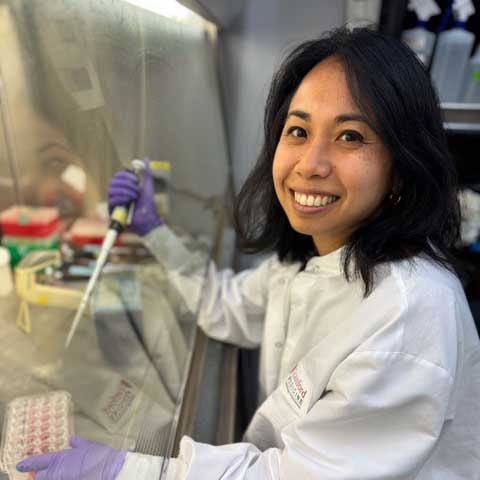
Pamela Basto, M.D., Ph.D.
For training at Stanford University School of Medicine with Drs. Edward Engleman and David Miklos
Metastatic disease causes 90% of cancer deaths, and while over the years we have gained a better understanding of the progression of disease, most advanced cancers continue to have poor prognoses. Aberrant glycosylation, one of the hallmarks of cancer, helps cancer cells extravasate blood vessels, invade tissues, inhibit immune responses, and spread to distant organs; yet these known targets remain therapeutically underdeveloped. Pamela is developing engineered cell therapies to target these functional mediators of metastatic progression. Results from her work will provide necessary new insights for the treatment of carcinomas.
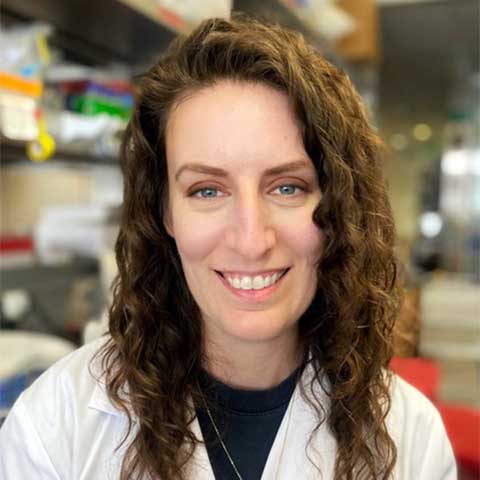
Rachael Chanin, Ph.D.
For training at Stanford University School of Medicine with Dr. Ami Bhatt
The human gut is home to trillions of microorganisms. These microbes perform crucial functions in human health by protecting against invading pathogenic organisms, educating the immune system, and producing essential vitamins or other metabolites. While there is broad understanding of the importance of these organisms and the ways in which they can influence human biology, we currently lack the ability to precisely target and manipulate them. Rachael’s research focuses on understanding how these microbes interact with each other and with the human body. In particular, she studies small invertible elements encoded in many of these beneficial microbes’ DNA. These elements function akin to a light switch, flipping ON or OFF molecular programs. Many of the microbial products regulated by these elements have been shown to directly impact the human body. Rachael is using a combination of advanced next generation sequencing techniques, computational analyses, and molecular assays to decode why and how microbes invert these elements. Deeper understanding of these elements will inform how to manipulate them and could open the door to a whole new class of microbe-targeted therapeutics.
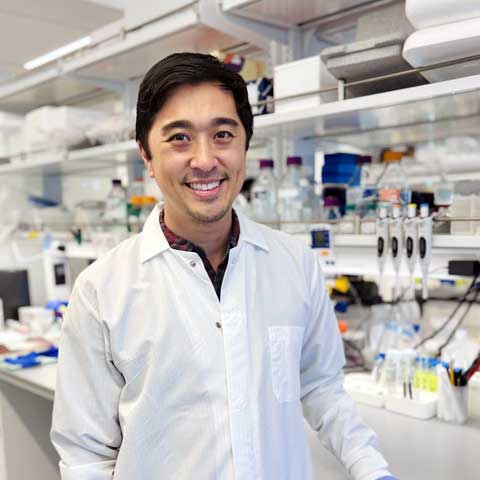
Richard Jin, M.D., Ph.D.
For training at the School of Medicine at University of California, San Francisco with Dr. Anna Molofsky
Early-life represents time of high susceptibility to viral infections as the immune system matures. Although most viral infections of childhood are self-limited, in some cases children can suffer from lasting neuropsychiatric symptoms called post-viral syndromes. Insults affecting the brain during critical developmental windows can be particularly disruptive. The factors driving these persistent symptoms and how severe infection shapes future behavior are not yet fully understood. In the developing brain, the immune system performs important yet at times dichotomous tasks; the immune system must defend against foreign pathogens and facilitate normal brain development. Richard uses a neonatal viral infection model to study how activated microglia fight infection and the consequences of this immune activation on brain development and behavior. He hopes that by understanding how immune challenges interfere with developmental processes in the brain, we can offer new avenues for prevention, early intervention, and therapeutic strategies for children.
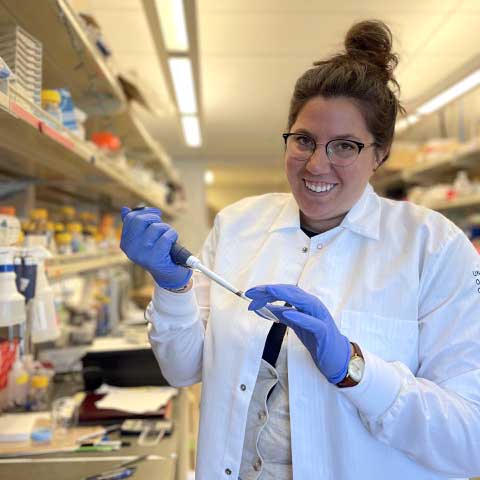
Mia Konjikusic, Ph.D.
For training at the School of Medicine at University of California, San Francisco with Dr. Jeremy Reiter
Today, one in four individuals will struggle with fertility as they attempt to conceive or are diagnosed as completely infertile altogether. Fertility and reproductive health is dictated by a multiple-organ signaling pathway that incorporates the entire body. This signaling pathway begins in the brain in a structure called the hypothalamus where neurons secrete a signal down the pituitary gland. The pituitary gland uptakes those signals and, as the body’s master hormonal regulator, secretes hormones out into the blood stream. Those hormones eventually make it to the reproductive organs where they are necessary for reproductive support. A lack of ability for cells to communicate to one another anywhere along this pathway can lead to infertility. Mia’s work focuses on understanding how this multi-organ system dictates fertility through faithful cell-to-cell communication. Mia is illuminating how a small, specialized, antenna-like organelle, called a primary cilium, dictates the cell-to-cell communication that is instrumental for fertility. Using a combination of cutting-edge genetics, hormone therapies, and advanced microscopy, Mia is determined to understand how primary cilia contribute to fertility and how we may harness our knowledge of the primary cilium in cell-to-cell communication to better treat those struggling with fertility issues.
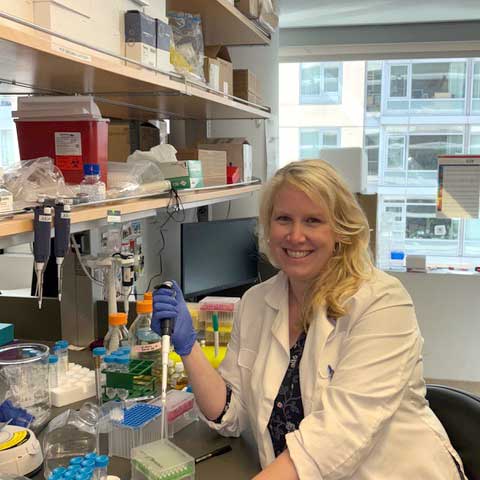
Kristen Mengasser, M.D., Ph.D.
For training at the School of Medicine at University of California, San Francisco with Drs. Alexander Marson and Mark Davis
The immune system is a complex defense network, designed to protect us from foreign invaders, such as bacteria or viruses. However, this system can go awry and inadvertently attack normal healthy tissue, leading to autoimmune diseases. Autoimmune diseases can affect any part of the body, and over 30 million patients in the US live with chronic symptoms of an autoimmune disease. Despite the prevalence of these conditions, we still do not fully understand how and why autoimmune diseases evolve. As a rheumatologist, Kristen sees patients with autoimmune disease in her clinic, inspiring her research of autoimmunity in the lab, using genetic tools. Specifically, she is developing a new model system for autoimmune disease by genetically modifying immune cell organoids: miniature replicas of the immune system in a dish. Her clinical work has led her to appreciate the importance of B cells in autoimmunity, and she is building technology to help us understand how B cells contribute to autoimmune diseases. Using these systems, Kristen hopes to illuminate the processes leading to autoimmunity and to improve our ability to diagnose and treat these challenging conditions.
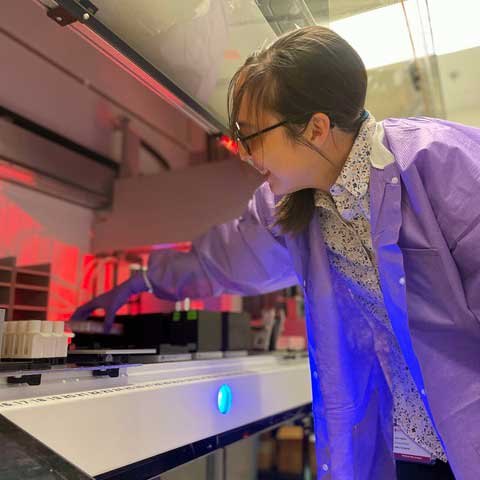
Debra Van Egeren, Ph.D.
For training at Stanford University School of Medicine with Dr. Christina Curtis
Cancers start when normal cells acquire abnormal abilities that enable them to survive and grow when they should not. While understanding how cells acquire these abnormal abilities is key to detecting and preventing cancer, these early steps can be very difficult to study in patients. In particular, sampling cells within a patient repeatedly over time is usually not possible, so we cannot easily observe the years-long process that transforms normal cells into a tumor. To overcome this limitation, Debra is creating novel in vitro experimental systems that better mimic the environmental features in patients that promote cancer development. By culturing normal and precancerous human cells as organoids in these conditions, she is recapitulating the natural process that leads to cancer in a carefully controlled and easily manipulable setting outside the body. She will use this system to study the molecular changes that cause cancer and identify the most common evolutionary paths in this process. Her findings may also help design better strategies to prevent cancer before it even starts.
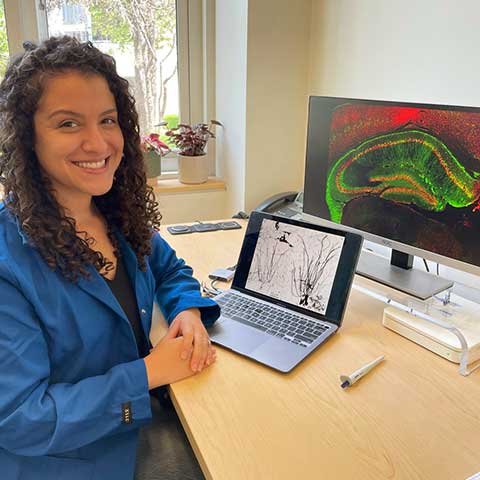
Jennifer Yonan, Ph.D.
For training at the School of Medicine at University of California, Irvine, with Dr. Oswald Stewart
During development, our brains rely on the mTOR signaling pathway to control neuronal growth and connectivity, proliferation, and survival, and in adulthood, mTOR is important for critical functions at synapses. Dysregulation of mTOR signaling is implicated in epilepsy and autism spectrum disorders, which may be due to abnormal neuron growth and the formation of inappropriate circuit connectivity. Despite years of basic research documenting the consequences of mTOR dysregulation on neural networks and behavior, little is known about how gene expression is changed to elicit such outcomes. The goal of Jennifer’s work is to identify mechanisms underlying brain and network hyperconnectivity and excitability following mTOR dysregulation using cutting-edge molecular, genetic, and neurophysiological techniques. Jennifer hopes that her research will help us to better understand the human brain in both health and disease states and take us a step closer to developing more targeted therapies for those affected by mTOR-related disorders.